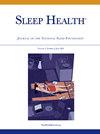The impact of idiopathic hypersomnia on the social lives of young adults
IF 3.4
2区 医学
Q2 CLINICAL NEUROLOGY
引用次数: 0
Abstract
Objectives
People with idiopathic hypersomnia report significant impairment in their lives due to idiopathic hypersomnia symptoms, and this likely includes an impact on social relationship health. This study investigated the effects of idiopathic hypersomnia on social relationships (friends, romantic, and sexual) during the key developmental period of young adulthood.
Methods
Young adults (N = 106; 18-39 years) with idiopathic hypersomnia were recruited through national hypersomnia patient organizations. Participants completed an online survey assessing the impact of symptoms on overall social functioning, as well as assessing friendships, romantic relationships, and sexual relationships.
Results
Nearly all participants (98%) reported that idiopathic hypersomnia made their social life more challenging. Over half (56%) felt they had too few close friends. While 69% were currently in a romantic relationship, the majority (92%) reported that idiopathic hypersomnia made it more challenging to enter a romantic relationship, with 89% stating that it impacted their sex life. Symptoms with the greatest perceived impact on social relationships were excessive sleepiness, brain fog, and long sleep. Most participants expressed that they would like their clinicians to ask about their social lives.
Conclusions
Idiopathic hypersomnia substantially impacts the social lives of young adults, including friendships, romantic partnerships, and sex lives. Despite the importance of social relationships, clinicians seldom address this topic during clinic visits. When considering whole person health for people with idiopathic hypersomnia, clinical care would benefit from more attention to social health.
特发性嗜睡症对年轻人社交生活的影响。
目的:特发性嗜睡患者报告由于特发性嗜睡症状对他们的生活造成了重大损害,这可能包括对社会关系健康的影响。本研究调查了特发性嗜睡症对青年期社会关系(朋友、恋爱和性)的影响。方法:青壮年(N = 106;18-39岁)特发性嗜睡患者通过全国性嗜睡患者组织招募。参与者完成了一项在线调查,评估症状对整体社会功能的影响,以及对友谊、恋爱关系和性关系的影响。结果:几乎所有参与者(98%)报告说,特发性嗜睡使他们的社交生活更具挑战性。超过一半(56%)的人觉得他们的亲密朋友太少了。虽然69%的人目前处于恋爱关系中,但大多数人(92%)报告说,特发性嗜睡症使进入恋爱关系变得更加困难,89%的人表示这影响了他们的性生活。对社会关系影响最大的症状是过度嗜睡、脑雾和长时间睡眠。大多数参与者表示,他们希望他们的临床医生询问他们的社交生活。结论:特发性嗜睡严重影响年轻人的社交生活,包括友谊、恋爱关系和性生活。尽管社会关系的重要性,临床医生很少解决这个问题,在诊所访问。在考虑特发性嗜睡症患者的整体健康时,临床护理应更多地关注社会健康。
本文章由计算机程序翻译,如有差异,请以英文原文为准。
求助全文
约1分钟内获得全文
求助全文
来源期刊

Sleep Health
CLINICAL NEUROLOGY-
CiteScore
6.30
自引率
9.80%
发文量
114
审稿时长
54 days
期刊介绍:
Sleep Health Journal of the National Sleep Foundation is a multidisciplinary journal that explores sleep''s role in population health and elucidates the social science perspective on sleep and health. Aligned with the National Sleep Foundation''s global authoritative, evidence-based voice for sleep health, the journal serves as the foremost publication for manuscripts that advance the sleep health of all members of society.The scope of the journal extends across diverse sleep-related fields, including anthropology, education, health services research, human development, international health, law, mental health, nursing, nutrition, psychology, public health, public policy, fatigue management, transportation, social work, and sociology. The journal welcomes original research articles, review articles, brief reports, special articles, letters to the editor, editorials, and commentaries.
 求助内容:
求助内容: 应助结果提醒方式:
应助结果提醒方式:


